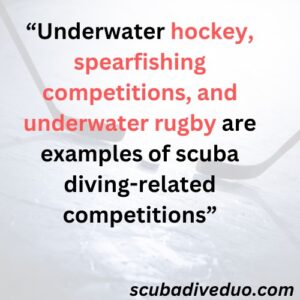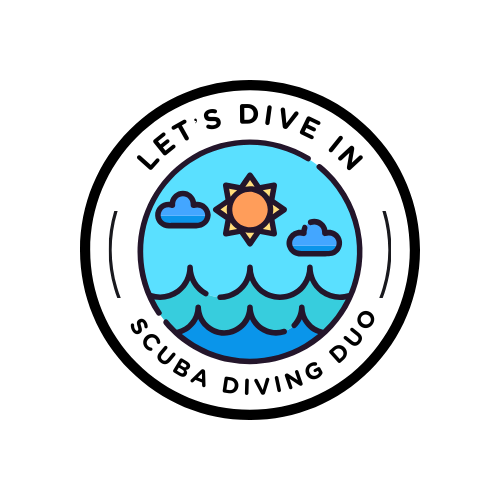Scuba diving, a world of underwater wonders and exploration, has long been a subject of debate among enthusiasts, experts, and novices alike. While some argue that it is unequivocally a sport, others firmly declare it a hobby. The line between the two designations blurs, and it’s a discussion that has intrigued the diving community for years.
On one side of the debate, there are those who emphasize the physical demands, training, and even competitions associated with scuba diving. They make a strong case for categorizing it as a sport, drawing parallels to other adrenaline-pumping activities. On the opposite end, proponents of the “hobby” label focus on the sheer enjoyment, the personal connection with marine life, and the leisurely pace of underwater exploration.
But where does the truth lie? Is scuba diving a sport, a hobby, or perhaps something uniquely in between? In this exploration of the scuba diving world, we’ll delve into the historical development, the defining characteristics, and the arguments on both sides of this intriguing debate. So, let’s descend into the depths of this discussion and navigate the ocean of perspectives that surround scuba diving’s classification.
jump to a specific section
Historical Perspective
Scuba diving, a captivating blend of adventure and discovery beneath the ocean’s surface, has an intriguing historical journey. To appreciate the ongoing debate about its classification as a sport or a hobby, it’s essential to explore its evolution and initial perception.
- Early Days: Scuba Diving as a Sport Scuba diving’s origins can be traced back to the early 20th century when innovators and explorers like Jacques-Yves Cousteau and Emile Gagnan developed the Aqua-Lung, a groundbreaking underwater breathing apparatus. In its nascent stages, scuba diving was unequivocally seen as a sport, primarily due to its inherent challenges and the physical demands it placed on divers. During this period, scuba diving was an activity that required not only courage but also physical endurance. Divers often had to navigate without the convenience of modern equipment and certifications. They were pioneers, pushing the boundaries of what was possible beneath the waves. Such daring feats earned scuba diving its initial reputation as an extreme sport, one that made hearts race and brows glisten with sweat.
- Changing Tides: Accessibility and Certifications As time progressed, scuba diving underwent a remarkable transformation. The sport became more accessible, attracting a broader range of enthusiasts. This accessibility led to a shift in perception, with many beginning to see scuba diving not just as a sport but as a recreational hobby, an avenue for underwater exploration and a personal connection with the aquatic world. The establishment of certification agencies, such as PADI (Professional Association of Diving Instructors) and NAUI (National Association of Underwater Instructors), played a pivotal role in this transformation. These organizations standardized training and safety protocols, making scuba diving more approachable for newcomers. Scuba diving no longer required arduous physical challenges, like the push-ups of yesteryears, making it more of an educational and leisure activity than an extreme sport. As the historical timeline advanced, more divers entered the underwater realm not for the thrill alone but for the sheer joy of interacting with marine life and exploring the magnificent underwater landscapes. Today, individuals can become certified divers with relatively little physical exertion, compared to the early days when strenuous tests were common place. The historical journey of scuba diving showcases how it transitioned from a sport characterized by physical prowess to a hobby that emphasizes accessibility, enjoyment, and adventure. This transformation forms the backdrop against which the debate over its classification as a sport or a hobby continues to unfold.
Defining Scuba Diving
Scuba diving is a mesmerizing underwater activity that combines elements of adventure, exploration, and a deep connection with the aquatic world. To better understand the ongoing debate surrounding its classification as a sport or a hobby, it’s crucial to clarify what scuba diving truly involves and how it incorporates aspects often associated with sports.
Equipment and Techniques in Scuba Diving
At its core, scuba diving involves the use of specialized equipment that enables individuals to breathe underwater and explore the depths of oceans, seas, lakes, and rivers. The primary components of scuba diving equipment include:
- Diving Mask: A mask provides a clear view underwater and protects the eyes, nose, and face while allowing the diver to see the incredible underwater world.
- Breathing Apparatus: Scuba divers use a self-contained underwater breathing apparatus (known as SCUBA), which includes a regulator, tanks containing compressed air or enriched air (nitrox), and a buoyancy control device (BCD). This equipment ensures that divers have a continuous and safe supply of air while submerged.
- Fins: Fins enhance a diver’s mobility and allow efficient movement through the water.

- Wetsuit or Drysuit: These suits provide thermal insulation and protection from the elements. They come in various thicknesses depending on water temperature.
- Weight System: Divers use a weight system to control their buoyancy and maintain stability in the water.
- Diving Computer: This device helps divers monitor their depth, bottom time, and decompression limits, ensuring safe ascents.
Key Aspects of Scuba Diving
Scuba diving encompasses various key aspects, some of which are associated with sports:
- Physical Endurance: While modern scuba diving doesn’t require extreme physical fitness, it does demand a certain level of physical endurance. Divers need to carry their equipment, navigate currents, and manage buoyancy, all of which involve physical exertion.
- Technical Skill: Divers must master various techniques, such as equalizing pressure, controlling buoyancy, and managing air consumption. Technical skills are crucial for safe and enjoyable dives.
- Safety Protocols: Safety is paramount in scuba diving, with divers following strict safety procedures, including dive planning, buddy checks, and emergency protocols. These safety practices are akin to the rigorous rules observed in many sports.
- Competition: While not as prominent as in traditional sports, competitive scuba diving events do exist, such as underwater hockey and fin swimming. These competitions emphasize speed, skill, and teamwork, aligning with common sports principles.
- Physical Activity: Scuba diving often involves physical movement against water resistance, which provides a low-impact workout. Divers engage their core and leg muscles to maintain buoyancy and propel themselves underwater.
The balance between adventure, exploration, and the physical and technical aspects of scuba diving makes it a unique and complex activity. While the physical demands are not as intense as those in traditional sports, they remain an integral part of the scuba diving experience. This multifaceted nature forms a foundation for the ongoing discussion of whether scuba diving should be classified as a sport, a hobby, or something in between.
Arguments for “Scuba Diving a Sport”
The debate over whether scuba diving should be considered a sport is not a clear-cut matter. Nonetheless, there are compelling arguments and evidence supporting the classification of scuba diving as a sport. Here are some of the key points in favor of this perspective:
- Physical Challenges: Scuba diving often demands physical stamina and agility. Divers need to handle their equipment, maintain buoyancy, swim against currents, and sometimes overcome challenging underwater conditions. These physical challenges are characteristic of many sports.
- Competitive Diving: Competitive diving events, such as underwater hockey, spearfishing competitions, and underwater rugby, underscore the sport-like qualities of scuba diving. These events involve strategy, teamwork, and an emphasis on skill and speed, similar to traditional sports.
- Training and Certification: Scuba divers go through rigorous training and certification processes. This training not only imparts essential safety skills but also elevates scuba diving to a sport-like activity. Divers must demonstrate competence in various techniques, much like athletes honing their skills.
- Diving Clubs and Organizations: The presence of diving clubs and organizations dedicated to competitive and team-based scuba diving activities adds weight to the argument. These groups organize competitions and championships, further solidifying scuba diving’s status as a sport.
- Adrenaline and Thrill: For many enthusiasts, scuba diving provides an adrenaline rush and a sense of thrill akin to extreme sports. Diving in challenging conditions, exploring deep wrecks, and encountering large marine life species can be exhilarating experiences, emphasizing the adventure aspect of scuba diving as a sport.
- Structured Training Regimens: Scuba divers often follow structured training regimens to improve their diving skills. This systematic approach to skill development mirrors the training routines of athletes in various sports.
- Professional Divers: Professional divers, such as those engaged in search and rescue missions, underwater welding, or marine biology research, often emphasize the sport-like aspects of their profession, where physical conditioning and skill mastery are critical.
- Competitive Freediving: While not scuba diving in the traditional sense, competitive freediving, which involves diving on a single breath, is a recognized sport. This sport incorporates elements of underwater exploration and competitive achievement.
- Dive Computers and Data Analysis: The use of dive computers for tracking dive profiles, monitoring safety limits, and analyzing dive data adds a technical and competitive aspect to scuba diving, much like the data analysis and performance measurement in various sports.
In sum, the arguments for classifying scuba diving as a sport revolve around the physical and technical challenges, competitive events, and structured training regimens that exist within the scuba diving community. While it may not fit the traditional sports mold, the sport-like aspects of scuba diving are evident and continue to contribute to the ongoing debate over its classification.
Comparison to Other Sports
Scuba diving is a unique and captivating activity that shares commonalities with recognized sports in some aspects but differs significantly in others. Comparing scuba diving to traditional sports can shed light on its place within the spectrum of recreational activities. Here, we examine scuba diving in terms of physical exertion, competition, and spectatorship, contrasting it with established sports.
Physical Exertion:
- Scuba Diving: Scuba diving involves physical exertion, especially when divers navigate currents, manage buoyancy, and carry their equipment. While it may not demand the same level of physical conditioning as many traditional sports, it provides a low-impact workout and engages core muscles.
- Traditional Sports: Traditional sports often require high levels of physical exertion and conditioning. Athletes in sports like soccer, basketball, and track and field engage in intense cardiovascular and strength training, making physical fitness a core component of their performance.
Competition:
- Scuba Diving: Competitive scuba diving events do exist, but they are relatively niche compared to mainstream sports. Underwater hockey, spearfishing competitions, and underwater rugby are examples of scuba diving-related competitions. These events emphasize teamwork, strategy, and skill, much like traditional sports.

- Traditional Sports: Traditional sports are characterized by widespread and highly organized competitive structures. Professional leagues, national teams, and international tournaments bring athletes from around the world together to compete for titles and trophies. Spectator interest is a significant driving force in traditional sports competitions.
Spectatorship:
- Scuba Diving: Scuba diving is not typically a spectator sport. Most diving experiences happen in remote underwater locations, away from the eyes of an audience. While there is a niche following for competitive diving events, they do not attract the mass spectatorship seen in traditional sports.
- Traditional Sports: Traditional sports often enjoy large and passionate fan bases. Fans attend games, watch broadcasts, and follow the progress of their favorite teams and athletes. Spectatorship is a defining characteristic of many sports, contributing to their cultural significance.
In summary, scuba diving differs from traditional sports in several key ways. While it involves physical exertion, it typically does not demand the same level of physical conditioning as many recognized sports. Competitive scuba diving events exist but are relatively niche, with limited spectatorship. Scuba diving offers a unique blend of adventure and physical activity, making it a distinct and captivating pursuit that appeals to those who seek both exploration and recreation
The Experience of Scuba Diving: Exploring the Underwater World
Scuba diving offers a one-of-a-kind journey into a realm that’s often considered alien and mysterious—our planet’s underwater world. The experience of scuba diving is a mesmerizing and transformative adventure, where individuals encounter a myriad of unique joys and experiences that are difficult to replicate in any other pursuit.
- Beneath the Surface: Scuba diving provides the rare opportunity to venture beneath the surface of our planet’s waters. As you descend into the depths, the transition from the world above to the world below is astonishing. The colors change, sounds become muted, and a sense of weightlessness takes over. It’s like stepping into a different dimension.
- Exploration and Discovery: The underwater world is a place of perpetual discovery. Whether you’re exploring coral reefs teeming with vibrant marine life, descending into the depths of shipwrecks, or gliding alongside gentle giants like sea turtles or manta rays, each dive presents a chance to uncover hidden wonders. The excitement of what you might encounter beneath the waves is a constant source of anticipation.
- Connection with Nature: Scuba diving offers an intimate connection with marine life that few other activities can match. You become part of the underwater environment, observing creatures in their natural habitats. From the curious clownfish darting in and out of anemones to the majestic dance of a school of barracuda, these interactions foster a profound connection with the natural world.
- Weightlessness and Freedom: The buoyancy control achieved in scuba diving creates a feeling of weightlessness and freedom. It’s an experience of moving effortlessly in three dimensions, a sensation that contrasts with the constraints of terrestrial life. Divers often describe it as akin to flying.
- Silence and Solitude: Underwater, the sounds of the terrestrial world disappear, leaving you with a unique sense of tranquility and solitude. The only sounds you hear are those of your own breathing and the gentle gurgling of bubbles. This meditative quality can be profoundly calming.
- Overcoming Challenges: Scuba diving is an activity that challenges you both mentally and physically. Navigating currents, managing buoyancy, and handling unexpected situations are part of the journey. Overcoming these challenges and gaining mastery adds a sense of achievement and personal growth.
- Adventure and Adrenaline: For those who seek it, scuba diving can provide an adrenaline rush akin to extreme sports. Diving in challenging conditions, exploring deep underwater caves, or encountering large and potentially dangerous marine life can be exhilarating experiences that quench the thirst for adventure.
- Environmental Conservation: Many scuba divers develop a deep appreciation for marine ecosystems and become ambassadors for environmental conservation. Witnessing the beauty and vulnerability of the underwater world often leads to a commitment to protect and preserve it for future generations.
In essence, the experience of scuba diving is a tapestry of unique moments, sensations, and encounters that leave divers with a profound sense of wonder, connection, and reverence for the world beneath the waves. It’s a journey that transforms perspectives, fosters appreciation for the beauty of nature, and leaves an indelible mark on the hearts of those who partake in this extraordinary adventure.
Scuba Diving as a Hobby: Connecting with Nature and Underwater Beauty
Scuba diving, often seen as an adventure sport, also finds its place as a cherished recreational hobby that allows individuals to forge a deep connection with the natural world and experience the breathtaking beauty that lies beneath the ocean’s surface. Here, we delve into the idea of scuba diving as a hobby, highlighting how it enables enthusiasts to immerse themselves in the underwater realm and appreciate its wonders.
- A Leisurely Pursuit: Scuba diving as a hobby signifies a leisurely escape from the hustle and bustle of everyday life. Divers embark on their underwater journeys at their own pace, making each dive a tranquil and rejuvenating experience. It’s not about racing the clock but rather about savoring every moment beneath the waves.
- Underwater Exploration: Hobbyist divers are drawn to the allure of underwater exploration. Whether it’s a coral reef teeming with colorful fish, a pristine shipwreck shrouded in history, or a serene kelp forest, scuba diving offers a gateway to uncharted territories. Every dive is an opportunity to explore, discover, and marvel at the hidden gems of the underwater world.
- Connection with Marine Life: Scuba diving as a hobby nurtures a deep connection with marine life. Enthusiasts are not passive spectators; they become part of the underwater ecosystem. Watching graceful sea turtles glide by or observing schools of fish going about their daily routines instills a sense of harmony and oneness with the aquatic environment.
- Meditation and Mindfulness: The underwater realm has a unique way of encouraging meditation and mindfulness. The silence, interrupted only by the soothing sounds of one’s own breathing, prompts a state of introspection and relaxation. Divers often find a sense of peace and tranquility that is difficult to replicate elsewhere.
- Marine Conservation: Many scuba diving hobbyists are passionate about marine conservation. Their love for the underwater world motivates them to become stewards of the oceans. They engage in initiatives to protect fragile ecosystems, remove marine debris, and raise awareness about the importance of preserving marine habitats.
- Photographic Artistry: Scuba diving enthusiasts often delve into underwater photography, capturing the stunning beauty of the aquatic world. This artistic pursuit allows them to share their experiences, raise awareness about marine conservation, and create lasting memories of their hobby.
- Learning and Personal Growth: Scuba diving as a hobby promotes continual learning and personal growth. Divers expand their knowledge about marine biology, underwater geography, and dive techniques. The process of mastering new skills and gaining a deeper understanding of the underwater environment is a rewarding aspect of the hobby.
- Shared Adventures: Scuba diving provides opportunities for shared adventures. Many divers enjoy this hobby with friends, family, or dive buddies, strengthening social connections and creating lasting memories together.
In essence, scuba diving as a hobby is a gateway to a world of wonder, a journey that encourages individuals to slow down, connect with nature, and embrace the serenity of the underwater realm. It’s a recreational pursuit that fosters appreciation for the planet’s aquatic beauty and offers a sense of fulfillment that transcends the adrenaline of extreme sports.

Conclusion
The debate surrounding whether scuba diving should be classified as a sport, a hobby, or perhaps something that defies such easy categorization, is a nuanced discussion. Throughout this exploration, we’ve encountered multiple arguments and perspectives, shedding light on the diverse and multifaceted nature of scuba diving.
On one hand, scuba diving exhibits sport-like characteristics through its physical challenges, competitive events, training and certifications, and technical skill requirements. Competitive diving, while niche, exists and underlines the sport-like aspects of this activity. The adrenaline rush and physical demands in certain forms of diving further fuel the argument for its classification as a sport.
On the other hand, scuba diving equally embodies the qualities of a recreational hobby. Its emphasis on leisurely exploration, connection with nature, and appreciation of underwater beauty invites divers to immerse themselves in the wonders of the underwater world. It’s a journey that promotes mindfulness, environmental conservation, and personal growth.
In essence, the experience of scuba diving defies a one-size-fits-all classification. It is a unique blend of adventure, physical exertion, and a profound connection with the aquatic world. Whether one views it as a sport, a hobby, or a bit of both ultimately depends on individual perspective.
As we conclude this discussion, we encourage you to form your own opinion. Dive into the world of scuba diving, experience its marvels, and decide for yourself whether it aligns more with the heart-pounding intensity of a sport, the leisurely pleasures of a hobby, or a fusion of both that transcends easy categorization. The beauty of scuba diving lies in the eye of the beholder, and the journey itself is what truly matters.

1 thought on “Is Scuba Diving a Sport?”